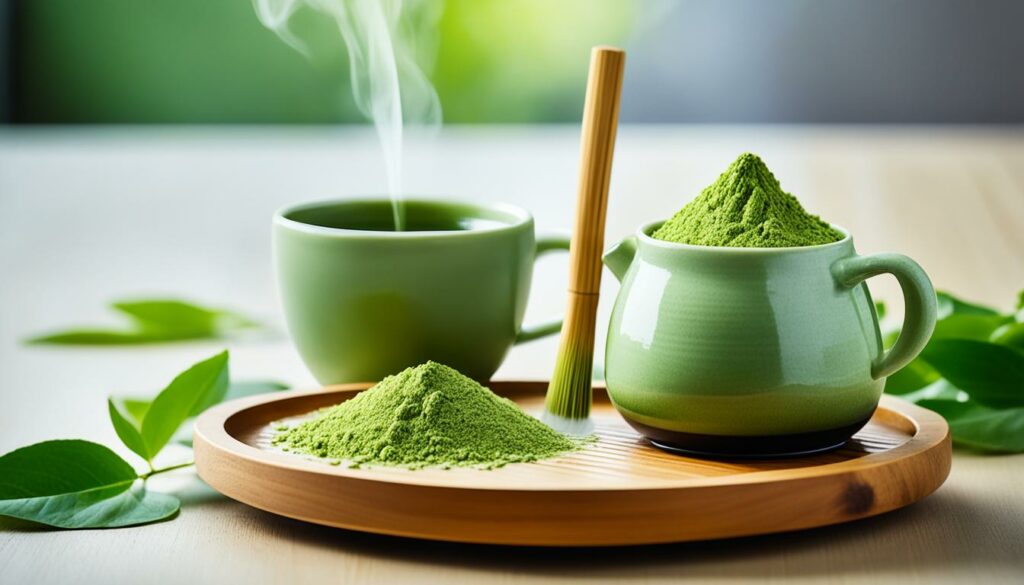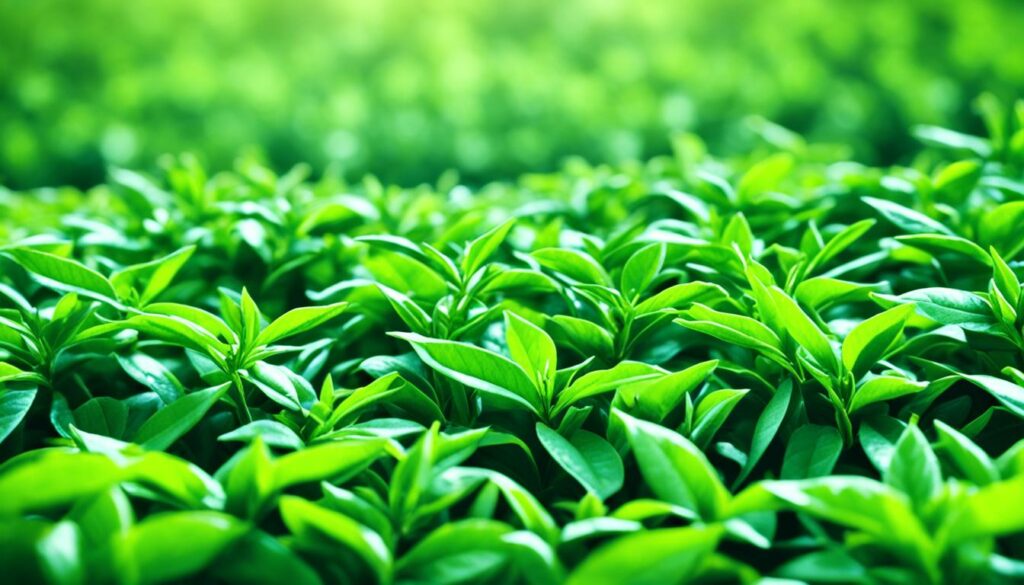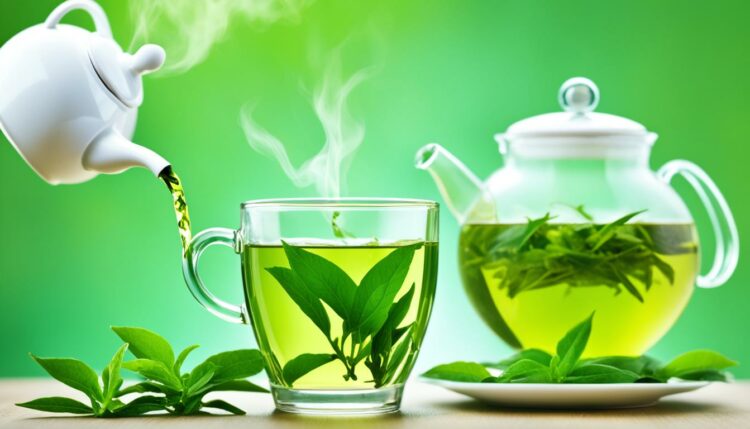Green tea is celebrated for its numerous health benefits and has gained popularity as a refreshing beverage. But with so many types of green tea available, it can be challenging to determine which one is the healthiest choice.
In this article, we will explore the different types of green tea and their potential health benefits to help you make an informed decision.
Key Takeaways:
- Green tea offers various potential health benefits due to its high antioxidant content.
- Matcha, a concentrated form of green tea, is lauded for its exceptional health properties.
- Different types of green tea, such as sencha and Longjing, offer their own unique flavors and benefits.
- Consider factors like caffeine content, flavor preferences, and sourcing when choosing green tea.
- Enjoy the potential health benefits of green tea by incorporating it into your daily routine in moderation.
What is Matcha?
Matcha is a type of powdered green tea that offers a unique and concentrated form of traditional green tea. Unlike regular green tea, which is brewed from loose leaves or tea bags, matcha is made by grinding specially grown and processed green tea leaves into a fine powder.
The cultivation process for matcha tea is different from that of regular green tea. Matcha tea bushes are shaded from direct sunlight several weeks before harvest. This shading increases the chlorophyll content in the leaves, resulting in a vibrant emerald green color.
The increased chlorophyll levels also enhance the production of amino acids, such as L-theanine, which gives matcha its unique umami flavor.
After the leaves are harvested, the stems and veins are carefully removed, leaving only the highest quality tender leaves. These leaves are then stone-ground into a fine powder using traditional methods, ensuring that matcha retains its vibrant color and nutritional properties.
Matcha contains more antioxidants and nutrients compared to regular green tea because it involves consuming the entire tea leaf. This allows you to benefit from the full range of compounds found in the leaves, including polyphenols and catechins, which are known for their antioxidant properties.
The vibrant green color and rich flavor of matcha make it a popular choice for both tea enthusiasts and culinary enthusiasts. Its versatility allows it to be used in a variety of recipes, from traditional Japanese tea ceremonies to matcha lattes, smoothies, and desserts.
To prepare matcha, a small amount of the powdered tea is whisked with hot water until frothy. This traditional method creates a vibrant green and velvety smooth drink, providing a moment of calm and relaxation. The ritual of making matcha can also be a peaceful and meditative experience.
Matcha is becoming increasingly popular worldwide for its unique flavor, health benefits, and versatility. Whether you’re searching for a nourishing beverage or a creative ingredient for culinary exploration, matcha green tea powder is a delightful addition to your lifestyle.
Health Benefits of Matcha
Matcha is not only a delicious and invigorating beverage, but it is also packed with numerous health benefits. This vibrant green tea is renowned for its high concentration of antioxidants, particularly catechins like EGCG.
These powerful compounds have been shown to reduce inflammation and promote cell repair, contributing to overall well-being. Let’s explore some of the specific health benefits of matcha:
Heart Health
Drinking matcha green tea may help lower the risk of heart disease. The antioxidants in matcha improve blood circulation, which can enhance cardiovascular health.
Moreover, matcha has shown potential in reducing LDL cholesterol levels, commonly known as “bad” cholesterol. By incorporating matcha into your daily routine, you can support a healthier heart.
Weight Loss
If you’re looking to shed some pounds, matcha may be a helpful addition to your weight loss journey. Matcha contains a combination of caffeine and catechins that can increase metabolism and stimulate fat oxidation. These properties can help boost your calorie-burning potential, making it easier to achieve your weight loss goals.
Brain Health
Matcha has been associated with improved brain function, memory, and concentration. The combination of caffeine and L-theanine, an amino acid abundant in matcha, promotes a state of relaxed alertness.
This means you can experience enhanced cognitive performance and mental clarity without the jitters that typically accompany caffeine consumption.
Blood Sugar Regulation
For individuals with diabetes or those looking to regulate blood sugar levels, matcha may be beneficial. The catechins in matcha have been found to improve insulin sensitivity, which can help regulate blood sugar levels. Adding matcha to your diet may contribute to better glycemic control and overall blood sugar management.
Incorporating matcha into your daily routine can provide these health benefits and more. Whether you enjoy it as a traditional warm tea or try it in a refreshing iced latte, matcha is a versatile and enjoyable way to boost your overall well-being.

Safety and Side Effects of Matcha
While matcha offers numerous health benefits, it is important to consume it in moderation. Drinking more than 2 cups per day is generally not recommended due to its high concentration of antioxidants and potential contaminants from the soil.
Matcha may cause stomach upset and headaches in some individuals, and excessive consumption may lead to liver and kidney toxicity. It’s crucial to choose organic matcha to reduce the risk of pesticide exposure.
Matcha also contains caffeine, so it may affect individuals who are sensitive to caffeine.
| Side Effects of Matcha | Safety Precautions |
|---|---|
| Stomach upset | Consume in moderation |
| Headaches | Choose organic matcha |
| Liver and kidney toxicity | Avoid excessive consumption |
| Contaminants in matcha | Drink organic matcha |
| Caffeine content | Be mindful of sensitivity to caffeine |
It’s important to note that the side effects of matcha can vary from person to person. If you experience any adverse effects after consuming matcha, it’s advisable to consult your healthcare professional.
Choosing the Right Green Tea for You
When it comes to selecting the perfect green tea for your taste and preferences, there are a few factors to consider. From caffeine content to flavor profiles, understanding these aspects can help you make an informed decision. Here’s a guide on how to choose the best green tea for you:
Caffeine Content
Caffeine sensitivity varies among individuals. If you prefer a milder tea with lower caffeine levels, opt for green teas like sencha or gunpowder. These varieties generally have less caffeine compared to others, allowing you to enjoy the health benefits of green tea without the stimulating effects.
Flavor Profile
Taste plays a significant role in tea enjoyment. Green teas range from grassy and vegetal to floral and nutty flavors. Sencha offers a refreshing, slightly vegetal taste, while gunpowder has a smoky flavor. Explore different flavor profiles to find the green tea that appeals to your taste buds the most.
Sourcing and Organic Certification
When choosing green tea, it’s essential to choose brands that offer transparent sourcing and ensure the highest quality and safety of the tea leaves. Look for reputable brands that prioritize organic certifications to avoid exposure to pesticides and other harmful substances.
Loose Leaf vs. Tea Bags
Decide between loose leaf green tea or tea bags based on your preference and convenience. Loose leaf green tea allows for a more immersive tea experience, as the leaves unfurl and steep to release their flavors fully. Tea bags, on the other hand, offer convenience and portability, making it a great option for tea on the go.
Exploring Flavored Green Teas
If you’re looking to add variety to your green tea selection, consider trying flavored green teas. These teas are infused with natural ingredients like fruits, flowers, or herbs to create unique flavor combinations. Some popular flavored green teas include jasmine green tea, mint green tea, and lemon green tea.
By considering factors like caffeine content, flavor, sourcing, and form, you can choose the green tea that best suits your taste and lifestyle. Whether it’s enjoying the richness of loose leaf green tea or the convenience of tea bags, there’s a green tea out there for everyone.

Other Varieties of Green Tea
In addition to matcha, there are various other types of green tea that offer unique flavors and health benefits. Chinese green teas, such as Longjing and Gunpowder, have distinct flavor profiles and are produced using specific methods. Japanese green teas, like sencha, are grown and processed differently compared to Chinese green teas. Let’s explore these varieties in detail:
Chinese Green Tea
Chinese green teas are known for their rich history and unique flavors. One popular variety is Longjing, also known as Dragon Well tea. It has a distinctive nutty taste and is produced in Hangzhou, China. Another famous Chinese green tea is Gunpowder, which is tightly rolled into small pellets and has a strong and slightly smoky flavor.
Japanese Green Tea
Japanese green teas are renowned for their vibrant green color and fresh taste. Sencha is the most widely consumed type of Japanese green tea. It is made from the young leaves of the tea plant and has a grassy and refreshing flavor. Another popular variety is Gyokuro, which is shaded before harvest to enhance its sweetness and umami flavor.
Each variety of green tea offers its own unique taste and potential health benefits. Whether you prefer the robust flavors of Chinese green teas or the fresh and grassy notes of Japanese green teas, there is a green tea variety to suit every palate.
Conclusion
Green tea, including matcha, is packed with antioxidants that offer numerous potential health benefits. While matcha is often touted as the healthiest variety of green tea, other types like sencha and Longjing also provide their own unique advantages. The key is to find a green tea that suits your taste preferences and aligns with your health goals.
When incorporating green tea into your daily routine, it’s important to consume it in moderation. Pay attention to factors like caffeine content and sourcing when selecting your green tea. Opt for organic options to ensure the highest quality and safety of the tea leaves.
By enjoying a cup of green tea each day, you can reap its potential health benefits while savoring a delightful brew. Whether you choose matcha, sencha, or another variety, green tea can be a refreshing addition to a healthy lifestyle.
FAQ
What are the health benefits of green tea?
Green tea offers various potential health benefits, including improved heart health, reduced skin damage from the sun, and potential weight loss aid.
What is matcha?
Matcha is a type of powdered green tea that is grown and prepared differently than regular green tea, resulting in higher antioxidant and caffeine contents.
What are the health benefits of matcha?
Matcha is loaded with antioxidants, promotes cell repair, may lower the risk of heart disease, aid in weight loss, improve brain function, regulate blood sugar levels, and improve insulin sensitivity.
Is matcha safe to drink?
Matcha is generally safe to drink, but it should be consumed in moderation to avoid potential side effects, such as stomach upset and headaches. Excessive consumption may lead to liver and kidney toxicity.
How do I choose the right green tea?
When choosing green tea, consider factors such as caffeine content, flavor, and sourcing. Look for certified organic brands that offer transparent sourcing to ensure the highest quality and safety of the tea leaves.
Are there other varieties of green tea?
Yes, there are various types of green tea, including Chinese green teas like Longjing and Gunpowder, and Japanese green teas like sencha. Each variety offers its own unique taste and potential health benefits.
What is the healthiest green tea?
While matcha is often marketed as the healthiest type of green tea, other varieties like sencha and Longjing also provide their own benefits. The key is to choose a green tea that suits your taste preferences and health goals.




